CHAPTER 6
THE MYSTERY OF THE FRONTAL LOBE
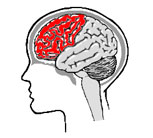
Anatomophysiology
The nervous system is made of millons of nerve cells that form an intricated network. Each nerve cell has a body that contains the nucleus, which maintains the cell alive, and many branches, called dendrites. The dendrites receive information from many other nerve cells. From the nerve body also departs a long extension called axon that sends messages to other nerve cells, muscle cells, or other organs. A bundle of axons form what we actually call a nerve. The place of junction where the nerve cells communicate with each other to send or receive information is called synapse.
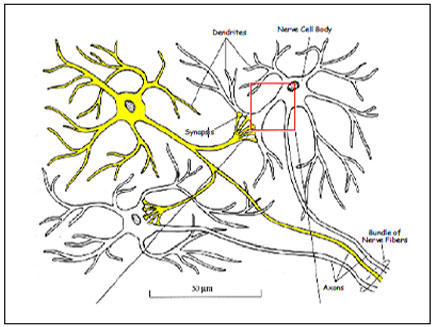
The synapses are quite complicated structures where the electrical impulses release chemical substances called neurotransmitters. The neurotransmitters are produced in small vesicles of the terminal bud of the sending neuron; then they are released into the synaptic cleft (= synaptic gap), that is the space between the two neurons, and finally they connect to specific receptors of the post-synaptic neuron to produce specific functions. Basically such actions can be classified into stimulation, inhibition, and modulation.
Some neurotransmitters are actually aminoacids, like glutamate and aspartate, others are hormons, like melatonin, insulin, and oxytocin. Even some gases, like nitric oxide and carbon monoxide, have physiological effects as neurotransmitters. (Wikipedia)
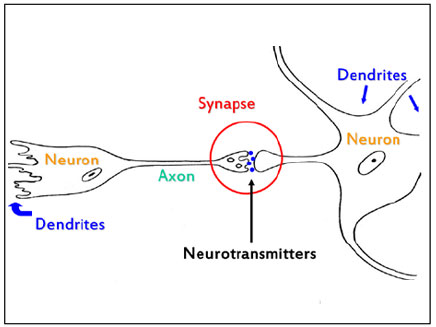
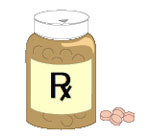
Drugs (legal and illegal), and foods contain substances that are either neurotransmitters or work in conjunction with them. There are many known, and probably many more unknown substances in nature that affect the synapses and stimulate, depress or modify the physiological functions. This may result in diverse sorts of effects like a sense of well-being, somnolence, reduced pain sensitivity, cardiac arrhythmia, hallucinations, psychosis, changes in personality, convulsions and death. The fast adaptation of the nerve system to such abnormal substances produces dependency.
Science is just barely understanding the intimate relationships between diet and behavior. It is certainly worth to think about the following inspired statement: “If the stomach is not properly cared for, the formation of an upright, moral character will be hindered. The brain and nerves are in sympathy with the stomach. Erroneous eating and drinking result in erroneous thinking and acting.” (Testimonies for the Church, vol. 9, p. 159)
Habits and Instincts
The innumerous connections in the nerve network constitute the anatomical basis for infinite possibilities of thought combinations and other functions of the brain that coordinate and control all processes of life, conscious and unconscious as well. Frequently repeated processes result in the formation of “pathways” that are then utilized without conscious thought or decision taking. These are called habits.
Good habits are useful, energy-saving, and even life-saving. Bad habits are destructive and a hindrance to health and happiness.
Instincts are congenital habits programmed into the genetic code. They determine how each creature will behave.

The best thing to do is to actively and consciously form new habits. The old ones remain dormant and may awake as soon as specific circumstances trigger them off. This explains why a “dry alcoholic” may fall back into his old habit after long time by just tasting a small dose of alcohol.
Recognizing the power of his habits and his own impotence to change them, the apostle Paul exclaimed in despair: “I do not understand my own actions. For I do not do what I want, but I do the very thing I hate.” (Romans 7:15 RSV) On the other hand he knew that there is a superior power capable to transform even the most profound traits of character. Therefore he could also declare with conviction: “I can do all things through Christ who gives me strength.” (Philippians 4:13)
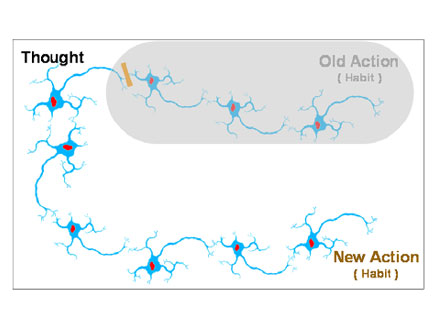
“No matter what may be our inherited or cultivated tendencies to wrong, we can overcome through the power that God gives. The Holy Spirit is our Helper.” (Manuscript Releases, vol. 18, p. 139)
“The change of the natural, inherited, and cultivated tendencies of the human heart, is that change of which Jesus spoke when he said to Nicodemus, ‘Except a man be born again, he cannot see (discern) the Kingdom of God.’… The change of heart represented by the new birth can be brought about only through the effectual working of the Holy Spirit.” (The Paulson Collection of Ellen G. White Letters, p. 412)
“Therefore, if anyone is in Christ, he is a new creation; old things have passed away; behold, all things have become new.” (2 Corinthians 5:17)
Key Points to Habit Change
We have seen that inherited tendencies and acquired habits can only be changed with God’s help. However, there are things that the person has to do on his side in this process. Let’s analyze them briefly:
- Analyze your habit(s). – The “old” action must become conscious in order to make possible changes. Determine what factors are involved and how they can be avoided.
- Focus on only one or two at a time. – You will need clear and concentrate efforts, otherwise your energies will get diluted.
- Use will power properly: Make choices not promises! – Broken promises are discourag-ing and will destroy your self-confidence. However, if an effort fails, you have only lost one battle, but not the war. Keep fighting!
- Replace old with new habits. – Physiologically speaking, habits cannot be “undone” but new pathways must be created.
- Make a strong initial effort. – Habits are strong and need to be addressed in a decided manner.
- Ask God for help. – Bad habits are a consequence of sin. Only God can overcome the power of the evil forces. “For we do not wrestle against flesh and blood, but against principalities, against powers, against the rulers of the darkness of this age, against spiritual hosts of wickedness in the heavenly places.” (Ephesians 6:12)
- Live a balanced, wholesome lifestyle. – No matter what the area of concern may be, chronic diseases, stress management, or changing habits, a healthy lifestyle will give you the needed physical, mental, and spiritual strength.
- Avoid temptations. – Don’t stick your finger in the lion’s mouth!
Functions of the Frontal Lobe
The brain controls all vital functions. There are different areas and centers where specific functions are located as can be seen in the annexed figure.
The moral functions – reasoning, judgement, decision, and willpower – are located in the frontal lobe. Individual with compromised frontal lobes show
- Impairment of moral principle
- Social impairment (loss of love for family)
- Lack of foresight
- Impairment of abstract reasoning
- Diminished mathematical understanding
- Loss of empathy
- Lack of restraint
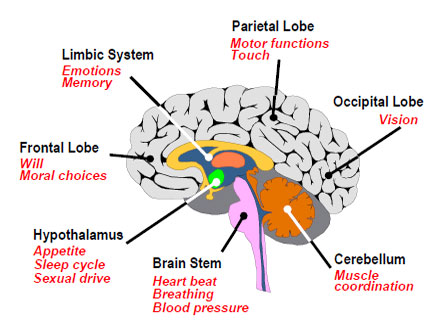
For best performance in intellectual activities, physical work, social relations, stress management and so on, the frontal lobe must function properly. The brain is an organ, like all other organs of the body, and needs oxygen, proper nutrition, mental exercise, protection from harmful substances and physical injuries. It is the most delicate of all organs and is easily affected by changes in the chemical composition of the blood.
We owe to Dr. Mervyn Hardinge, founder and director emeritus of the Loma Linda School of Public Health, in California, the following summary of the factors that compromise the frontal lobe functions (see picture).
Again we recognize the factors of the known NEWSTART® program. A healthy lifestyle is necessary for the best functioning of the brain, including spiritual growth.
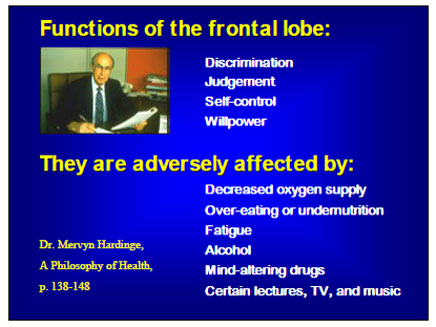
For best performance in intellectual activities, physical work, social relations, stress management and so on, the frontal lobe must function properly. The brain is an organ, like all other organs of the body, and needs oxygen, proper nutrition, mental exercise, protection from harmful substances and physical injuries. It is the most delicate of all organs and is easily affected by changes in the chemical composition of the blood.
Once more, I like to emphasize the great sensitivity of the brain compared with other organs. Let’s take for example the skin or the bones. They can survive without oxygen for several hours without apparent damage. The brain would cease to live after 5 minutes without oxygen or suffer severe permanent damage. The same happens with fatigue. A physically or mentally fatigued individual can hardly think clearly and has almost no energy to take right decisions, nor has he the willpower to act. How many good boys and girls have lost their moral integrity after a night in a disco! In such places occurs a sum of several detrimental circumstances: fatigue, lack of oxygen, alcohol and sometimes drugs, and noise. (See below under music.)
Harmful Substances in Food
All components of our blood – and therefore all substances that constitute our cells – come from the air we breathe, the water we drink, and the food we eat. All necessary nutrients (proteins, fats, carbohydrates, vitamins, minerals, phytochemicals, etc.) are available in the foods we eat, but there are also many harmful substances, either occurring naturally (many poisons and drugs), or as a result of fermentation (alcohol, vinegar), or industrial processing (benzopyrene, acrylamide, trans-fatty acids, etc.). Besides, there are often imbalances of good substances in the diet, either insufficient or in excess. It is therefore vital to learn how to select, combine and prepare wholesome, nutritious dishes for best functioning of our organism and to avoid all that is harmful.
Alcohol
 The pharmacological action of alcohol is general anesthesia. The nervous system is most vulnerable because alcohol dissolves quickly in the cerebrospinal fluid and because the nerve cells are very delicate. The frontal lobe is the first one to be anesthetized and then it continues down according to Jackson’s law of descending paralysis: Brain cortex → subcortical centers → spinal cord → brain stem (respiratory center). The effect of alcohol is therefore divided in four stages:
The pharmacological action of alcohol is general anesthesia. The nervous system is most vulnerable because alcohol dissolves quickly in the cerebrospinal fluid and because the nerve cells are very delicate. The frontal lobe is the first one to be anesthetized and then it continues down according to Jackson’s law of descending paralysis: Brain cortex → subcortical centers → spinal cord → brain stem (respiratory center). The effect of alcohol is therefore divided in four stages:
- Reduced manual skill and self-criticism, euphoria, increased errors. The euphoria is NOT a stimulation of the mental functions but lack of frontal lobe control! The individual is very sociable and apparently still functioning. However, this is the stage of the accidents!
- Loss of emotional control, incoordination, liberation of animal instincts. This is the stage of crimes of all kinds! At least half of the crimes are committed by individuals who would never act in such way without alcohol.
- Sleep, unconsciousness, coma.
- Skin is wet, cold, defecation, involuntary urinating, respiratory paralysis and death.
“Results of autopsy studies show that patients with a history of chronic alcohol consumption have smaller, lighter, more shrunken brains than nonalcoholic adults of the same age and gender. This finding has been repeatedly confirmed in living alcoholics using structural imaging techniques, such as computed tomography (CT) and magnetic resonance imaging (MRI). … Imaging reveals shrinkage to be more extensive in the folded outer layer (i.e., cortex) of the frontal lobe, which is believed to be the seat of higher intellectual functions. … Shrinkage also occurs in deeper brain regions, including brain structures associated with memory, as well as in the cerebellum, which helps regulate coordination and balance.” (National Institute on Alcohol Abuse and Alcoholism, No. 47, April 2000, http://pubs.niaaa.nih.gov/publications/aa47.htm)
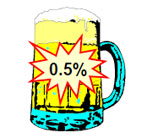
The only safe attitude towards alcohol is total abstinence! “Do not gaze at wine when it is red, when it sparkles in the cup, when it goes down smoothly! In the end it bites like a snake and poisons like a viper.” (Proverbs 23: 31-32) I urge my fellow believers not to drink alcohol-free beer or wine to give a good example to our youth!
Coffee

“The immediate effect of caffeine is a stimulation of the central nervous system, the heart, the digestive tract, and the kidneys. By exciting the brain, it gives an illusionary sense of energy and well-being without in any way giving relaxation or rest, or increasing muscle power. The brain is stimulated to a more rapid flow of thought until the excitement subsides, then depression and fatigue follow.” (M. Hardinge, A Philosophy of Health, p. 132)
“While it is commonly believed that caffeine increases mental alertness and speeds up motor performance, it can affect motor skill adversely when delicate muscular coordination and accurate timing are required.” (Goodman & Gilman, The Pharmacological Basis of Therapeutics, 1970, p. 358-368)
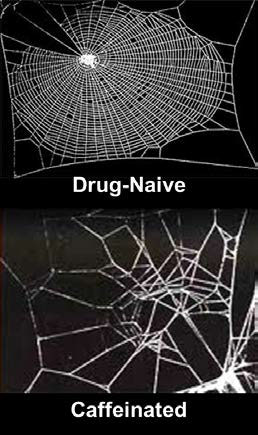
The main problem of coffee is not the stimulation of the brain itself but its many other undesired effects on coronary disease, blood pressure, gastric secretion, blood sugar and cholesterol levels. It also has been associated, at least as a potentiator, with cancers of the bladder and pancreas. In high doses it also can lead to psychiatric disorders like anxiety and sleep disorders.
“In large amounts, and especially over extended periods of time, caffeine can lead to a condition known as ‘caffeinism.’ Caffeinism usually combines ‘caffeine dependency’ with a wide range of unpleasant physical and mental conditions including nervousness, irritability, anxiety, tremulousness, muscle twitching (hyperreflexia), insomnia, headaches, respiratory alkalosis and heart palpitations. Furthermore, because caffeine increases the production of stomach acid, high usage over time can lead to peptic ulcers, erosive esophagitis, and gastroesophageal reflux disease. However, since both ‘regular’ and decaffeinated coffees have been shown to stimulate the gastric mucosa and increase stomach acid secretion, caffeine is probably not the sole component of coffee responsible.” (http://en.wikipedia.org/wiki/Caffeine)
Here follow some inspired counsels of Ellen G. White written in 1890:
“Coffee is a hurtful indulgence. It temporarily excites the mind to unwonted action, but the aftereffect is exhaustion, prostration, paralysis of the mental, moral, and physical powers. The mind becomes enervated, and unless through determined effort the habit is overcome, the activity of the brain is permanently lessened. All these nerve irritants are wearing away the life forces, and the restlessness caused by shattered nerves, the impatience, the mental feebleness, become a warring element, antagonizing to spiritual progress. …
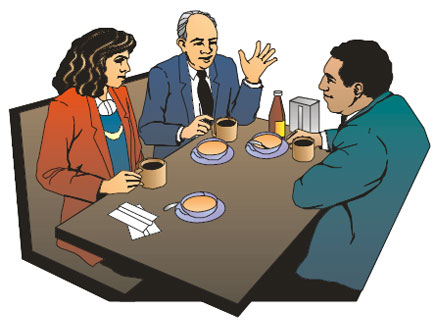 “Those who resort to tea and coffee for stimulation to labor, will feel the evil effects of this course in trembling nerves and lack of self-control. Tired nerves need rest and quiet. Nature needs time to recuperate her exhausted energies. But if her forces are goaded on by use of stimulants, there is, whenever this process is repeated, a lessening of real force. For a time more may be accomplished under the unnatural stimulus, but gradually it becomes more difficult to rouse the energies to the desired point, and at last exhausted nature can no longer respond….
“Those who resort to tea and coffee for stimulation to labor, will feel the evil effects of this course in trembling nerves and lack of self-control. Tired nerves need rest and quiet. Nature needs time to recuperate her exhausted energies. But if her forces are goaded on by use of stimulants, there is, whenever this process is repeated, a lessening of real force. For a time more may be accomplished under the unnatural stimulus, but gradually it becomes more difficult to rouse the energies to the desired point, and at last exhausted nature can no longer respond….
“The habit of drinking tea and coffee is a greater evil than is often suspected. Many who have accustomed themselves to the use of stimulating drinks, suffer from headache and nervous prostration, and lose much time on account of sickness. They imagine they cannot live without the stimulus, and are ignorant of its effect upon health. What makes it the more dangerous is, that its evil effects are so often attributed to other causes.” (Counsels on Diet and Foods, p. 421- 422)
“When these tea and coffee users meet together for social entertainment the effects of their pernicious habit are manifest. All partake freely of their favorite beverages, and as the stimulation influence is felt, their tongues are loosened, and they begin the wicked work of talking against others. Their words are not few or well chosen.” (Temperance, p. 79)
Ellen G. White’s writings indicate that people should drink coffee and tea only for rare medicinal purposes.
Meat

“Eating much flesh will diminish intellectual activity. Students would accomplish much more in their studies if they never tasted meat. When the animal part of the human nature is strengthened by meat-eating, the intellectual power diminishes proportionately. A religious life can be more successfully gained and maintained if meat is discarded, for this diet stimulates into intense activity lustful propensities, and enfeebles the moral and spiritual nature. ‘The flesh warreth against the spirit, and the spirit against the flesh.’ Gál. 5:17.” (Counsels on Diet and Foods, p. 389)
Cheese
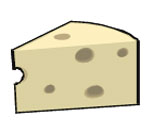
“Another related chemical that causes brain transmission problems is tryptamine. Like tyramine it is classed as a ‘biogenic amine.’ Tryptamine is known for its mind-altering effects. It has been associated with nightmares and is even classed with drugs like LSD and psilocybin because it can cause hallucinogenic effects. Interestingly, food sources of tryptamine often contain tyramine as well. Examples of foods with reported concentrations of these mind-destabilizing elements include cheese, fish, and sausages.” (N Nedley, Proof Positive, p. 275)
Sugar
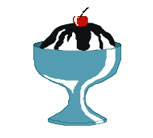
“The brain, however, does not have much room to store nutrients – space is extremely limited by the hard shell of the skull. Thus, for peak performance, the frontal lobe requires blood with a steady and adequate glucose level. A diet containing lots of refined foods can cause the blood sugar to rise quickly, and then fall below normal. Such food options abound at snack machines and dessert counters. They are best left out of our diets. It would be better to eat liberally of a wholesome variety of complex carbohydrates such as those found in potatoes, rice, whole grain breads, and cereals.
“Years ago when scientists first discovered that the brain functioned best with carbohydrate fuel, some people began referring to candy bars as ‘brain food.’ Eventually we learned that, for sustained performance, refined sugar was not brain food at all; it was just the opposite.
“One study of 46 five-year old boys was particularly revealing. Boys with little sugar in their diet had superior attention spans and more accurate responses than their high-sugar consuming peers. The difference could not be explained by IQ or the parent’s social or education status. When tested, the boys on a low refined-sugar diet performed the equivalent of one whole grade letter higher in school.” (N Nedley, Proof Positive, p. 273)
Ellen G. White gives the following short explanation about sugar:
“I frequently sit down to the tables of the brethren and sisters, and see that they use a great amount of milk and sugar. These clog the system, irritate the digestive organs, and affect the brain. Anything that hinders the active motion of the living machinery, affects the brain very directly. And from the light given me, sugar, when largely used, is more injurious than meat.” (Testimony Studies on Diet and Foods, p. 121)
“Sugar is not good for the stomach. It causes fermentation, and this clouds the brain and brings peevishness into the disposition.” (Counsels on Diet and Foods, p. 327)
Drugs

- The sensations are far from being normal. Sometimes the individual loses connection with reality and behaves abnormally.
- Overdoses often produce coma and death. Long term use damages the liver, is frequently associated with poor health, and certainly damages the frontal lobe. With time the individual changes his social behavior and seeks other companions. Priorities in life change and are centered on the drug.
- After the “high” is over the individual suffers a “down”, which is accompanied by very unpleasant physical and psychical withdrawal symptoms thus causing dependency (addiction). The down is often so awful that the individual desperately seeks another dose just to return to “normal”. Abrupt withdrawal, also called cool turkey may be very painful and individuals need to be protected from harming themselves, jumping out the window, etc.
- The best protection from drugs is to never experiment them, not touching them, and to react with a decided NO when tempted by friends.
Other Foods That Influence the Brain
Television

Talking about television, we must consider two aspects. First, the content of the program, and everybody knows that most TV programs are loaded with immorality and violence. Their illusionary scenes provide a distorted view of reality (comparable to the psychoactive drugs). Such should be avoided as being “bad food” for the mind. Secondly, the way in which the messages are presented. It is this aspect we want to focus because it is often overlooked.
The following thoughts are excerpts from Dr. Nedley’s book Proof Positive, p. 278-286:
Let’s start with hypnosis. “The connection between hypnotism and the frontal lobe comes as no surprise to those who understand this technique. Hypnosis, by design, bypasses the frontal lobe as it helps the subject enter into a trance-like state. Dr. Freda Morris, a former professor of medical psychology at UCLA, has written several books on hypnosis. In her words, hypnosis is a state characterized by a single-minded focus on only one thing, ‘like a bird watching a snake’. While hypnotized, the subject is inattentive to all other environmental cues. A hypnotist can often induce such a state first by helping the subjects to remain quiet and still, free from all outside diversions. Next, the hypnotist helps them develop that new focus ‘on a certain point’. Once they enter a hypnotic state, they are encouraged to follow the hypnotist’s mind.
“If brain waves were measured with an EEG (electroencephalogram) during this process, we would see that the hypnotized person loses beta waves from the brain. This beta activity indicates sound thinking that involved dynamic frontal lobe activity. In the hypnotized state, however, an alpha brain pattern is operative, during which we do not critically analyze incoming information. Alpha waves are brain waves of a lower frequency than beta waves. In this state, an individual will record information and suggestions without interpretation and without frontal lobe filtering.
“A flickering light that trains the eyes to focus in one place has been noted to easily induce a hypnotic state. During the hypnotic state, individuals can receive information of various kinds, and can mentally record the duties the hypnotist asks them to perform. Indeed, their memory works well, their emotions work fine, and they can laugh and cry. But as they continue to focus on the flickering light they do not critically analyze the information they receive. None of the information is filtered according to their sense of values or moral worth; their very reasoning powers are being bypassed. The frontal lobe has been short-circuited.”
“The classic setting for TV watching is similar to a typical environment for hypnotism induction: a darkened room, a flickering light (the TV set) as a single-minded focus, and freedom from all outside diversions…. Does what you watch make any difference on your mind and character? The answer is both yes and no. Although the content you view exerts a powerful effect on your mind, the medium itself also appears to have profound mental effects. Evidence suggests that the very vehicle of television is – in itself – usually detrimental. This deleterious frontal lobe effect appears to be the result of the camera-switching work in most videos and other programming. The technical problem with the filming technique is referred to as a ‘rapidly changing scene of reference.’ Specifically, the average television program changes its scene of reference every three to five seconds. The perspective from which you are viewing the event suddenly changes many times each minute, whether you want it to or not. This is in sharp contrast to how we normally view the world around us: we see real life scenes from one perspective (where we are located at the time the events happen). We can change our perspective only by voluntarily moving.
“Dr. Morris sites television’s rapid change of reference as contributing to the hypnotic-type effect. Research by Dr. Thomas Mulholland looked at children’s EEGs as they watched their favorite television programs. The researchers assumed that since these programs were their favorite shows, the kids would be mentally involved with what they were viewing and would experience an oscillation between alpha brain wave activity and beta. Instead, after just two or three minutes of the show, they sat back and stayed almost entirely in an alpha pattern. This meant that while they were watching they were ‘not reacting, not orienting, not focusing, just spaced-out.’” (N. Nedley, Proof Positive, p. 278-286)
The effects of television are far-reaching as can be seen in the following list:
Trains in non-reaction
- Increases aggressiveness
- Reduces sensitivity to violence
- Increases daydreaming
- Decreases creativity
- Reduces discernment
- Is addictive
- Less interest in reading and learning
- Poor health habits
- Poor attitudes
- Earlier and increased sexual activity
Music

Music is very powerful, it is the universal language understood by every being. It can transmit positive, ennobling thoughts but also can produce detrimental effects on the mind and immune system. It can be soft and soothing or intensive and irritating.
Basically, music has three components:
- Harmony – that influences mostly the thoughts.
- Melody – that affects largely the feelings.
- Rhythm – that incites movement.
Of course, any music is a mixture of all these three components in various proportions causing an entire spectrum of effects. It is easy to appreciate such effects by turning on a radio and search for different stations. There may be a vivid classical music on one station, followed by a traditional church choral, then perhaps a feminine soprano voice singing an aria, or the frenetic beat of a rock band. You will immediately feel the differences and such will be the effects on your system! There is no need for rationalization.
A lot has been written about the influence of music by individuals who were once active rock stars and later became converted. I refer to such literature for more insight. 1) Look for books or cassettes from Bryan Neumann, Louis Torres, and others or attend one of their seminars about music.
 At this place I wish to emphasize an important point that is often overlooked. One thing is to sing actively and another is to listen passively.
At this place I wish to emphasize an important point that is often overlooked. One thing is to sing actively and another is to listen passively.
“With a song, Jesus in His earthly life met temptation. Often when sharp, stinging words were spoken, often when the atmosphere about Him was heavy with gloom, with dissatisfaction, distrust, or oppressive fear, was heard His song of faith and holy cheer.” (Education, p. 166)
“The history of the songs of the Bible is full of suggestion as to the uses and benefits of music and song. Music is often perverted to serve purposes of evil, and it thus becomes one of the most alluring agencies of temptation. But, rightly employed, it is a precious gift of God, designed to uplift the thoughts to high and noble themes, to inspire and elevate the soul.
“As the children of Israel, journeying through the wilderness, cheered their way by the music of sacred song, so God bids His children today gladden their pilgrim life. There are few means more effective for fixing His words in the memory than repeating them in song. And such song has wonderful power. It has power to subdue rude and uncultivated natures; power to quicken thought and to awaken sympathy, to promote harmony of action, and to banish the gloom and foreboding that destroy courage and weaken effort.
“It is one of the most effective means of impressing the heart with spiritual truth. How often to the soul hard-pressed and ready to despair, memory recalls some word of God’s – the long-forgotten burden of a childhood song, – and temptations lose their power, life takes on new meaning and new purpose, and courage and gladness are imparted to other souls!
“The value of song as a means of education should never be lost sight of. Let there be singing in the home, of songs that are sweet and pure, and there will be fewer words of censure and more of cheerfulness and hope and joy. Let there be singing in the school, and the pupils will be drawn closer to God, to their teachers, and to one another.
“As a part of religious service, singing is as much an act of worship as is prayer. Indeed, many a song is prayer.” (Education, p. 167-168)
When you sing you have to think about the words. Your mind – thoughts and feelings – focus on your song. Your endocrine constellation will adapt to your mood. You cannot cry and sing at the same time. You can sing while you are walking or hum while you are working. You wish to overcome the stresses of life and be a winner! Follow the example of Jesus: “Just keep praising God, and when the devil tempts you, sing. When Christ was a child He was tempted in every way, and what did He do? He sang psalms, and praised God, and there was music in His voice. And there was an impression made upon the hearts and minds of those who heard Him.” (Sermons and Talks, vol. 1, p. 311)
The psalmist said, “I will sing to the LORD all my life; I will sing praise to my God as long as I live.” (Psalms 104:33)
The ears are the second large receptors of the brain. They cannot be closed and receive the information 24 hours a day, 7 days a week. Only mental blockage during sleep hours makes the individual unaware of the still present infiltration of subliminal messages.

Like any other organ, the brain also needs phases of rest to recover energy and vigor for new tasks. In modern life, especially in the cities, there is almost no time for meditation and introspection. No time for thinking. No wonder that people become nervous, restless, irritable, impatient and insecure. Such an overloaded brain is at the border of breakdown and depression – a rapid increasing characteristic of modern civilization!
Best Food for the Brain
Whole Plant Based Foods
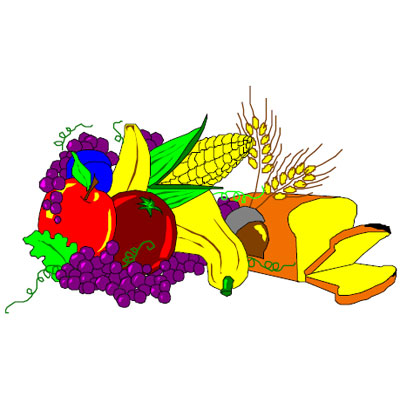 “Grains, fruits, nuts, and vegetables constitute the diet chosen for us by our Creator. These foods, prepared in as simple and natural a manner as possible, are the most healthful and nourishing. They impart a strength, a power of endurance, and a vigor of intellect that are not afforded by a more complex and stimulating diet.” (Ministry of Healing, p. 296)
“Grains, fruits, nuts, and vegetables constitute the diet chosen for us by our Creator. These foods, prepared in as simple and natural a manner as possible, are the most healthful and nourishing. They impart a strength, a power of endurance, and a vigor of intellect that are not afforded by a more complex and stimulating diet.” (Ministry of Healing, p. 296)
Study of The Bible


-o-O-o-
References
| ↑1 | Look for books or cassettes from Bryan Neumann, Louis Torres, and others or attend one of their seminars about music. |
|---|


 Trains in non-reaction
Trains in non-reaction